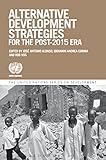Alternative development strategies for the post-2015 era / edited by José Antonio Alonso, Giovanni Andrea Cornia, Rob Vos.
Material type: TextSeries: United Nations series on developmentPublication details: London ; New York : Bloomsbury , 2014.Description: xliii, 406 p. : ill.; 25 cmISBN:
TextSeries: United Nations series on developmentPublication details: London ; New York : Bloomsbury , 2014.Description: xliii, 406 p. : ill.; 25 cmISBN: - 9781472532404 (hdk.)
- 9781472523259 (pbk.)
- 1472523253 (pbk.)
- 1472532406 (hdk.)
- 9781472532404 (hardback)
- 9781472523259 (paperback)
- Alternative development strategies in the post-2015 era
- Economic development
- Millennium Development Goals
- Economic development -- Government policy
- Economic development -- International cooperation
- Environmental protection -- International cooperation
- Globalization -- Economic aspects
- Proyectos de desarrollo económico
- Desarrollo económico -- Política gubernamental
- Desarrollo económico -- Cooperación internacional
- Protección al medio ambiente -- Cooperación internacional
- Globalización -- Aspectos económicos
- Objetivos de Desarrollo del Milenio
- 338.9
- HD 87 A466 2014
| Item type | Current library | Home library | Collection | Shelving location | Call number | Vol info | Copy number | Status | Barcode | |
|---|---|---|---|---|---|---|---|---|---|---|
 Libro
Libro
|
Biblioteca Juan Bosch | Biblioteca Juan Bosch | Ciencias Sociales | Ciencias Sociales (3er. Piso) | HD 87 A466 2014 (Browse shelf(Opens below)) | 4 | 1 | Available | 00000114335 |
"Published in association with the United Nations, New York, January 2014."
Includes bibliographical references and index.
Globalization at crossroads : key challenges for the twenty-first century -- Should global goal setting continue, and how, in the post-2015 era? -- Do we need new development models? The impact of neo-liberal policies -- Learning from the past : which of the past/current development strategies are best suited to deal with the "quadruple crisis"? -- Towards climate-compatible and resilient development -- Aiming for food and nutrition security in a changed global context: strategy to end hunger -- Demographic dynamics and the international development strategy beyond 2015 -- Common elements for inclusive and sustainable development strategies beyond 2015 -- Building a stable and equitable global monetary system -- From aid to globa development policy -- International migration in the development agenda -- The enabling international environment.
The global economic crisis of 2008-2009 exposed systemic failings at the core of economic policy making worldwide. The crisis came on top of several other crises, including skyrocketing and highly volatile world food and energy prices and climate change. This book argues that new policy approaches are needed to address such devastating global development challenges and to avoid the potentially catastrophic consequences to livelihoods worldwide that would result from present approaches. The contributors to the book are independent development experts, brought together by the UN to identify a development strategy capable of promoting a broad-based economic recovery and at the same time guaranteeing social equity and environmental sustainability both within countries and internationally. This new development approach seeks to promote the reforms needed to improve global governance, providing a more equitable distribution of global public goods. The contributors offer a critical evaluation of past development experiences and report on their creative search for new and well-thought out answers for the future. They suggest that economic progress, fairer societies and environmental sustainability can be compatible objectives, but only when pursued simultaneously by all.
In English.
"Published in association with the United Nations New York, January 2014"
There are no comments on this title.

